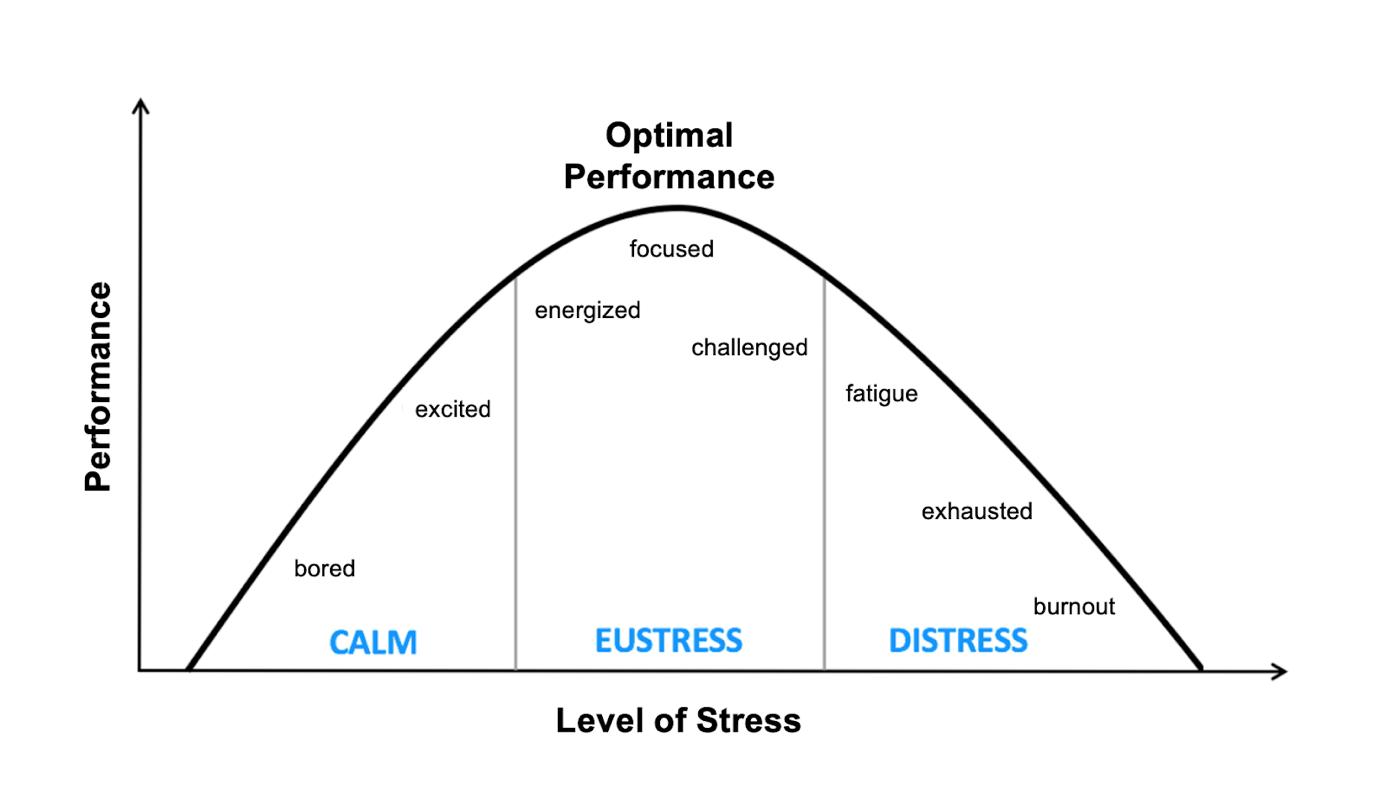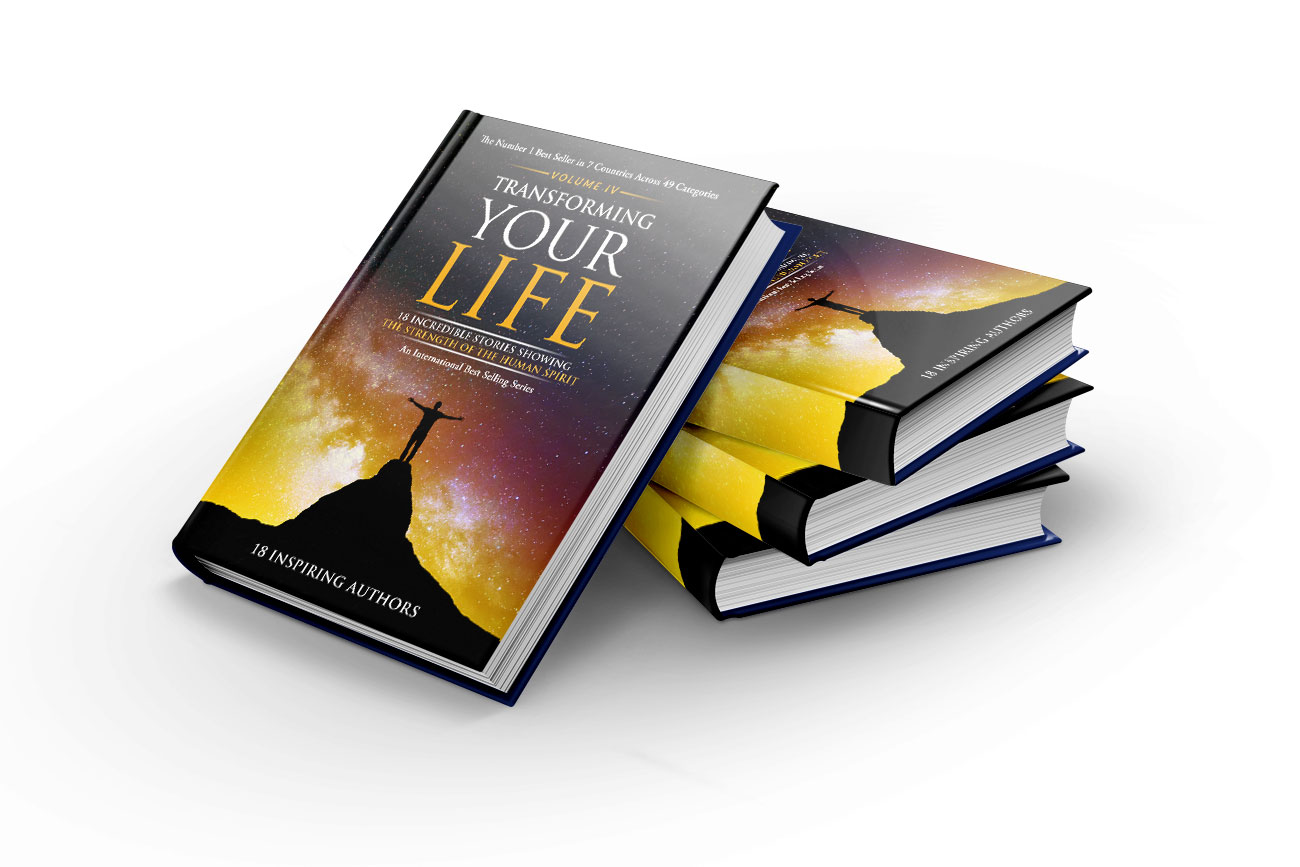5 years ago, I collapsed from stress.
My life was busy, to say the least. Most days I skipped breakfast, by midmorning when I did get hungry, I had a quick snack—not the healthy kind—that I consumed with my second cup of coffee. I usually had lunch in less than 20 minutes. When I was traveling, I often just grabbed a sandwich on the run. Between 1 pm and 3 pm, I frequently experienced a noticeable dip in my energy level and had a hard time concentrating, so I routinely treated myself with some sugary snacks together with another cup of coffee. That did help for a while but was often followed by an energy crash at some point, which often left me feeling easily agitated and strongly influenced my ability to focus.
Dinner was usually my biggest meal and the primary factor in my weight gain. To unwind from the stresses of the day, I usually had a glass or two of wine as well. After one last check of my emails, I typically went to bed around 12:30 am – 1 am, often sleeping fitfully and at most 6 hours. On the nights I entertained clients, I regularly had more to drink which more often than not left me feeling groggy the next morning.
At the same time, there was little about my life that made me feel positive. My relationship had just ended; with so little time together, the feeling of romance and intimacy was just gone.
As for hobbies, I often felt like I had no energy left at the end of the day for anything beyond collapsing on the couch and watching TV.
The increasing demands at work — aggressive sales targets, tight deadlines, constantly juggling multiple tasks — and the dissatisfaction with my personal life also made it more and more difficult to stay focused mentally at work.
Managing my time, which had never been much of an issue when I was working as an individual contributor, was significantly more challenging now that I had to manage my own team.
On a typical day, I received between sixty to ninety emails and at least a dozen calls and voicemails. I was responding all day to other people’s issues and rarely had time to set my own agenda.
It also became increasingly difficult to focus on any given task for long. I rarely took breaks, often stayed at work late, and routinely answered emails in the evenings and on weekends. Even during vacations, I felt compelled to check my messages every day.
External demands often left me feeling stressed and overwhelmed. I wasn’t passionate about work anymore, and I spent very little time reflecting on the choices I had made both personally and professionally. Without even realizing it at first, I was in the middle of a downward spiral. But of course, there were signs…
- Chronic fatigue – constantly feeling tired throughout the day
- Never-ending to-do lists – working long hours trying to catch up
- Inability to concentrate – being unproductive and procrastinating
- Racing thoughts – it was impossible to turn off my thoughts at night
- Use of alcohol to relax – trying to boost my mood and calm my mind
I was distracting myself in an attempt to cope with stress, as well as to avoid my shortcomings. The day of my breakdown was ultimately the day I realized that the way I was working wasn’t working and that I had to make a change. I knew I couldn’t live in a state of constant stress for any longer. Not only did it affect my performance at work, but it was also detrimental to my health and well-being.
The day I collapsed from stress was the day I finally realized how the choices I had previously made had led me to the lowest point in my life, and I started crying uncontrollably. It was the day I promised myself that I will do whatever it takes to get my energy, my confidence, and my happiness back.
Let me be clear, I didn’t go from chronically stressed and unsatisfied one day to being energetic, happy, and productive the next. It was a process with ups and downs, good days and bad days, but slowly there were more good days than bad days.
The first thing I did was to find someone who has been where I was and who had successfully overcome the challenges I was facing in my life. I knew that a world-class coach would not only hold me accountable to keep my commitments but would also allow me to create change, far faster than if I would have done it all myself. During the next three months:
- I defined my top priorities in life.
- I discovered my personal core values.
- I got rid of energy-draining people in my life.
- I started to write down 3 things I am grateful for every day.
- I began to meditate daily and learned to focus and single-task again.
- I made some significant changes to my nutrition (though there is still room for improvement).
This was only the beginning of my journey. Over the next years, I threw myself wholeheartedly into transforming myself — into discovering and decoding exactly how the world’s best performers bring out their best consistently without burning out in the process.
And on my own journey (after countless hours of trial and error), I figured out what really works for me and other people and what doesn’t work. And what started as my own struggle ultimately turned into my biggest passion and purpose in life: to help B2B sales managers perform at their very best consistently without ruining their health, their relationships, and their happiness in the process.
I had to learn the hard way that there is no trade-off between being a high performer and living a balanced life. In fact, my performance improved dramatically once I started prioritizing my well-being.
For far too long, we all have been operating under the false assumption that feeling exhausted and burned out is the necessary price for being successful. My own experience as well as my clients’ burnout breakthroughs have shown that this is far from true.
Are You Headed For Burnout?
According to Gallup’s recent report, Employee Burnout: Causes and Cures, 76% of employees experience burnout on the job at least sometimes, and 28% say they are burned out “very often” or “always” at work. In today’s fast-paced world, it’s becoming increasingly difficult to distinguish between stress and burnout. In fact, one of the questions I’m asked most frequently is, “How do I know if I’m burned out?”
Burnout is a reaction to prolonged or chronic stress and is characterized by three main dimensions: exhaustion, cynicism, and feelings of reduced professional ability. More simply put, if you feel exhausted, start to hate your job, and begin to feel less capable at work, you are showing signs of burnout.
Here are some of the most common signs of burnout:
- Work alienation: Individuals experiencing burnout view their jobs as increasingly stressful and frustrating. They may grow cynical about their working conditions and the people they work with. They may also emotionally distance themselves and begin to feel numb about their work.
- Physical symptoms: Chronic stress may lead to physical symptoms, like chest pain, headaches, stomachaches, or intestinal issues.
- Emotional exhaustion: Burnout causes people to feel drained, unable to cope, and tired, ultimately resulting in a lack of energy to get their work done.
- Reduced performance: Burnout mainly affects everyday tasks at work. Individuals with burnout feel negative about tasks. They have difficulty concentrating and often lack creativity.
If you are experiencing any of the above symptoms, you might want to take a step back and assess causes and any changes you might need to make.
Let’s next look at what might be the reason why people end up burning out at work in the first place. According to a 2018 report by Gallup, employee burnout has five main causes:
- Unreasonable time pressure: Employees who say they have enough time to do their work are 70 percent less likely to experience burnout.
- Lack of communication and support from a manager: Manager support offers a psychological buffer against stress. Employees who feel strongly supported by their manager are 70 percent less likely to experience burnout on a regular basis.
- Lack of role clarity: Only 60 percent of workers know what is expected of them. When expectations are not clearly communicated, employees can become exhausted just trying to figure out what’s expected of them.
- Unmanageable workload: When a workload feels unmanageable, even the most optimistic employees will feel hopeless. Feeling overwhelmed can quickly lead to burnout.
- Unfair treatment: Employees who feel they are treated unfairly at work are 2.3 times more likely to experience burnout. Unfair treatment may include things such as favoritism, unfair compensation, and mistreatment from a co-worker.
Burnout is a difficult and impactful reality that can lead to many negative consequences in all areas of your life. Recognizing the symptoms and identifying the causes is the first step to making changes in your life.
Tips To Break Free From Burnout
I. How you think about stress matters
In 2012, researchers at the University of Wisconsin conducted a study asking almost 29,000 people two questions:
- How much stress have you had in the past year?
- Do you think stress is harmful to your health?
In the study, individuals who reported high levels of stress and believed that stress had a large impact on their health actually had an increased risk of premature death by 43%. Meanwhile, those who reported high levels of stress but did not believe it had a negative impact on their health were found to have the lowest risk of premature death of every group in the study. This suggests that the very way we perceive stress is one of the most important factors influencing how it affects our health. Rather than trying to reduce or avoid stress, we can learn to use it as a tool for greater performance and well-being. This change in mindset is achieved in part by redefining stress into two different types of stress: eustress and distress.
Eustress is positive stress and is actually necessary for our overall well-being. This is the type of “positive” stress that keeps us vital and excited about life.
Distress, on the other hand, is negative stress and can make us feel overwhelmed because our resources (physical, emotional, and mental) are inadequate to meet the demands we are facing.

Eustress, or positive stress, has the following characteristics:
- Is perceived as within our coping abilities
- Improves performance
- Is short-term stress
- Feels exciting
- Is energizing
Examples: stretch projects, developing new skills, learning a new language, performing in a competition, etc.
In contrast, distress, or negative stress, has the following characteristics:
- Is perceived as outside of our coping abilities
- Can be short- or long-term stress
- Impairs performance
- Feels unpleasant
- Is draining
Examples: 10-hour workdays without breaks, fears about job security, unexpected health issues, etc.
In daily life, we often use the term “stress” to describe negative situations. This leads many of us to believe that all stress is bad for us, which is not true. It’s our interpretation of the stressor itself that has the biggest impact on how we perceive any situation or event.
Telling yourself stress is good is a start, but it’s not going to be enough. According to Carol Dweck, a mindset researcher at Stanford University, we can do more than just view stress as positive. Here are 5 key steps to change your stress response:
- Recognize that stress is a universal phenomenon. Everyone experiences stress, it’s not unique to you.
- Acknowledge that you have the ability to manage stress. It’s a skill you can learn and improve over time.
- Observe your self-talk around stress. If you find yourself overwhelmed by stress, take a step back and change the story you tell yourself, e.g., change from “I can’t deal with this” to “I’ve dealt with similar situations in the past, and I can do it again”.
- Try to identify your physical responses to stress in the body. Where do you feel it in your body? Are there physical sensations that act as an early warning sign? Try to identify those early warning signs in your body to notice stress quicker.
- Examine and learn from each stressful event. Ask yourself, “what is it that I can learn from this and how can I use what I’ve learned to improve my stress response next time? Each stressful event leaves a psychological footprint known as stress inoculation by psychologists; this is your brain’s way to prepare yourself in advance to handle future stressful events successfully and with a minimum of upset. Learn to harness it.
II. The principle of oscillation
We can learn to better manage stress by understanding and embracing the oscillatory nature of stress. Oscillation refers to the rhythmic movement between stress and recovery. Ultimately, it’s not stress that produces burnout but rather the duration of stress without intermittent recovery.
What it comes down to is that our bodies are designed to move rhythmically between the expenditure of energy (stress) and the renewal of energy (recovery). Energy can be defined most simply as the capacity to do work. Every 90 minutes or so, we oscillate from higher to lower alertness (also known as ultradian rhythms).
More often than not, and especially when demand is high, we don’t pay much attention to signs such as physical restlessness, wandering attention, greater irritability, a tendency to procrastinate, and a higher incidence of mistakes. Instead, we override it with coffee, sweets, and other stimulants, but most of all by depleting our energy reserves, in the form of stress hormones such as adrenaline and cortisol. These hormones are known as catabolic energy. While catabolic energy provides you with an energy boost to combat stress in the short term when used on a long-term basis, it imparts physical, emotional, and mental tolls that are potentially destructive and ultimately undermine your effectiveness.
Often the assumption is, that effective renewal requires a notable amount of time. In fact, the value of renewal depends less on how long you recover than it does on how well you recover. Just as it’s not how many hours you work, but it’s how much you get done in the hours that you do work. In short, taking a break every 90 minutes or so helps you to refuel, recharge, and re-energize and ultimately allows you to get more accomplished, in less time, at a higher level of quality, and more sustainably.
III. Strategies to recover your energy
There are many different strategies that can help you to recover your energy, but after working with hundreds of clients the following have proven to have the biggest impact on your performance, health, and happiness:
1. Exercise
What makes exercise one of the best ways to recover energy is that it’s simultaneously a way to build our physical capacity while renewing our mental and emotional energy reservoirs. In other words, working out not only increases our strength and endurance but also helps us to regain focus and to improve our mood.
Increasingly, the research suggests that we need to train both our cardiovascular fitness (at least 2x a week) and our strength (at least 1x a week) with each workout being at least 30–45 minutes. The benefit of increasing our cardiovascular capacity is that it allows us to better move oxygen through our body. From the age of 30, our heart’s ability to do so efficiently drops by almost 1 percent every year. In addition to that, without exercise, from the age of 30, we start losing an average of 200g of lean muscle mass every year. We have one overall energy reservoir, and the more energy we require physically just to accomplish daily tasks, the more fatigued we become and the less energy we have available for everything else we want to do.
2. Sleep
Sleep is one of the most productive activities we can do, or as Matthew Walker, Ph.D., puts it in his brilliant book ‘Why We Sleep’: “Scientists have discovered a revolutionary treatment that makes you live longer, it enhances your memory and makes you more creative, it makes you age slower, it keeps you slim and lowers food cravings, it protects you from cancer and dementia, it protects you from colds and the flu, it lowers your risks for heart disease and stroke, and even makes you feel happier, less depressed, and less anxious. These are the benefits of a full night of sleep documented in as many as 17.000 scientific reports to date.”
So, how long is a full night of sleep? According to the National Sleep Foundation, it’s recommended that healthy adults sleep between 7 and 9 hours per night. Sleep is an essential function that allows you to refuel, recharge, and re-energize physically, emotionally, and mentally. Giving yourself adequate periods of rest and recovery is a guaranteed way to increase your energy, focus, productivity, and even your happiness.
3. Nutrition & Hydration
The food choices we make each and every day, in terms of when, what, and how much we eat have an immediate impact on our energy, focus, memory, performance, and overall well-being. No matter what diet you prefer (paleo, vegetarian, vegan, pescatarian, etc.), there is one thing you need to keep in mind when it comes to eating: KEEPING YOUR BLOOD SUGAR LEVELS BALANCED! Balanced blood sugar levels keep your energy levels stable, your mood balanced, and your mind focused. However, when disrupted, our blood sugar can lead to increased sugar cravings, irritability, poor sleep, anxiety, and weight gain. The best way to keep your blood sugar steady is to spread your daily energy intake (calories) over the day without skipping a meal. When you eat five smaller meals per day, instead of two or three large ones, you will supply your body and brain with the constant energy it needs to perform at its best. Hydration is equally as important. Being mildly dehydrated, just around 2%, has been found to impair brain performance. In general, you should aim for drinking about half an ounce of water per pound of body weight or your weight in kg multiplied by 0.033.
4. Breathing
Breathing is an unconscious act, but are you breathing right? According to medical experts, most people breathe at less than half of their full capacity. Every system in the body relies on oxygen. Effective breathing can not only provide you with a greater sense of mental clarity, but it can also help you sleep better, calm your nerves, sharpen your focus, minimize negative and distracting thoughts, improve your body’s immune response, reduce stress levels, and promote stamina. When it comes to breathing, nose breathing is better than mouth breathing. Nasal breathing leads to a 10 to 20 percent higher oxygen intake, helps you sustain your energy throughout the day, and reduces stress. So, use your nose more!
5. Close Relationships
A Harvard Study on adult development (considered to be the most extended study on adult life) found that our relationships and how happy we are in those relationships are primary factors that contribute to our health and happiness. In addition, Gallup found that one of the key factors in sustained performance is having at least one good friend at work. By devoting more time to your most important relationships, you will not only feel happier, but you will also get the recovery that you need to perform better at work.
From Stress To Success
In a high-pressure, high-stress work environment, maintaining a consistently high level of performance has become more difficult than ever. How we perform depends as much on how we recover energy as on how we spend it. I had to learn the hard way that energy is the most precious resource we have at our disposal. In fact, I’ve come to realize that how we manage our energy is even more important than how we manage our time.
Whenever you are ready… here are 3 ways I can help you accelerate to your next level of performance & success:
- Free Resource – A Practical, Actionable Guide To Help Busy Sales Managers Thrive In The New Age of Hybrid Working.
- Mindset Mastery Course – Get My Online Course To Upgrade Your Mental Operating System (Join 250+ Sales Managers).
- Tailored Coaching Program – Work With Me 1:1 To Achieve A Whole New Level Of Leadership Performance & Sales Success.







